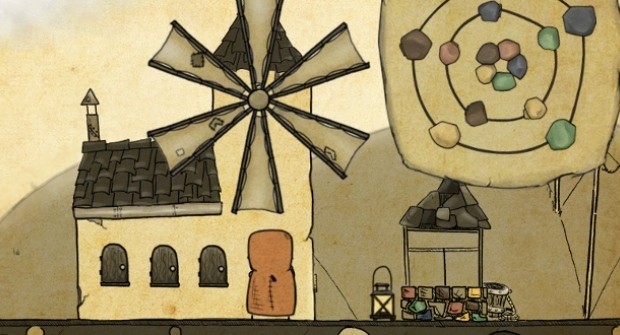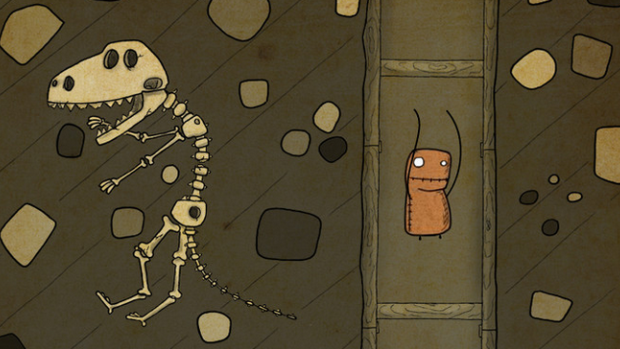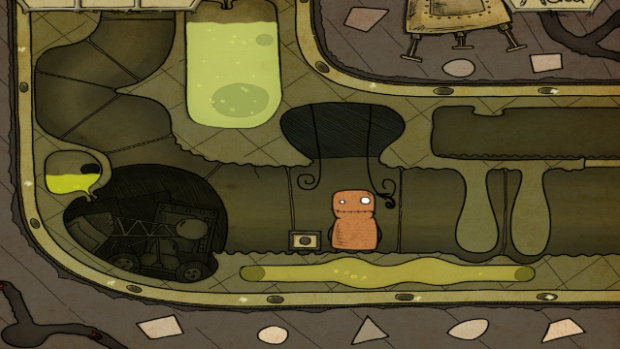Gomo Review
Daedalic Entertainment is undoubtedly one of the premier purveyors of adventure games – especially now that its forefather and inspiration, Lucasarts, has closed its doors for good. The German company has produced several award-winning games and series, such as Deponia, Edna & Harvey and A New Beginning, but this latest title has been developed by Slovakian outfit Fishcow Studios, and is their first full release.
Gomo started its life as an independent Flash-based game, but since teaming up with Daedalic, Fishcow were able to raise their sights a little and go for a full digital release on Steam. Gomo is a fairly basic point and click title wherein you control the titular character, who is mute in a largely mute world. This makes for an almost entirely visual experience, and allows the gameplay to be placed at the forefront.

Gomo awakes one day to find that his beloved pet dog has been abducted by an alien, who demands that Gomo find a rare red crystal for him – which can only be found deep underground. The rest of the game consists of Gomo finding said crystal, then tracking down the alien abductor, in order to retrieve his faithful friend. The game is very simple, and that brief plot outline sums up the entirety of the narrative.
Almost every screen in the game is a self-contained puzzle, or series of puzzles; there is very little back-tracking or head-scratching, and it’s an incredibly linear title. In fact, Gomo can easily be completed in a little over an hour – so whether you choose to play in easy mode or not (easy mode simply adds a glowing highlight to objects you can interact with, nothing more), the experience is a short and undemanding one. The puzzles aren’t bad, just far too simple.
There are both inventory-based and logic-based ones puzzles, sliding tiles and codes tocrack, but none of these will likely stump you for long. The solution to most of them can actually be found lying around, or pinned to a wall, as long as you keep an eye open. All the inventory puzzles are incredibly straight-forward: you hardly ever have more than one item at a time, so if you try that one item every time you are presented with a puzzle, nine out of ten times it will work.

The graphics are probably the strongest point, with a nice hand-drawn cartoon style allowing for quite a lot of expression in both faces and animation, despite the simplistic designs. The visuals are a bit weird, such as Gomo having dangling Gorilla-like arms, and angry foxes blocking your progression – but these give the game its character and charm. The aesthetic is a little washed-out, mainly consisting of browns and greys, but this does fit in with the subterranean mining theme quite well.
There are a few comic moments as you make your way through the adventure,which work well with the dead-pan mime style. Gomo is a strange character no doubt, and some of the actions and their unusual, over-the-top outcomes don’t make a whole lot of sense, but many are played for laughs and add to the strange atmosphere. None are weirder than the scene in which Gomo appears to nuke an entire village by accident.
The sound design is fairly successful, although some musical themes do repeat a few times too often. In general, though, the music is relaxing and unobtrusive – reminiscent of something that might be found in Machinarium, another laid-back adventure title. The fact that all characters are mute (or speak in unintelligible grunts), means that voices aren’t something to even consider, but the rest of the sound effects are nice enough, and help complement the on-screen action.

VERDICT: Gomo does have some real charm in its simple yet appealing visuals and its strange sense of humour, but it is seriously lacking in the gameplay department. It is far too short and even the most inexperienced point and click gamers won’t take more than a couple of hours to complete the game. After that there is nothing to really come back to, and neither the puzzles nor the plot are interesting enough to warrant a second play-through. You can see Gomo’s indie roots clearly, and maybe it would have found its place better in its original flash-based format.

AVERAGE. The epitome of a 50/50 game, this title will be unspectacular but inoffensive, charmless but amiable. We aren’t condemning a game by scoring it a 5, but we certainly aren’t championing it, either.
Review code provided by publisher.





